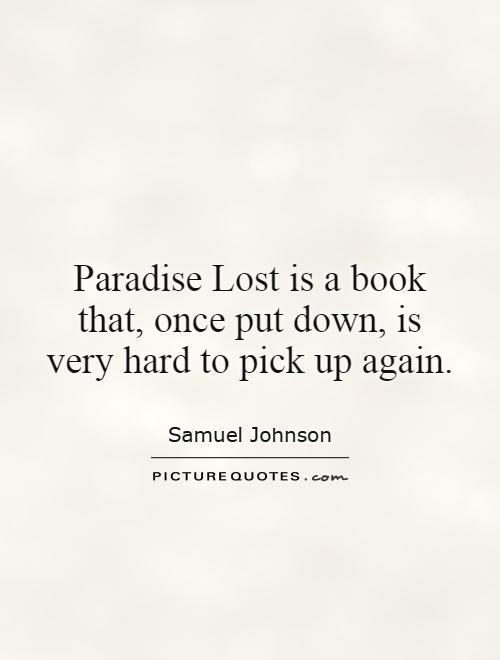Paradise Lost is a book that, once put down, is very hard to pick up again

Paradise Lost is a book that, once put down, is very hard to pick up again
Samuel Johnson, the renowned English writer and critic, was known for his insightful commentary on literature and his keen understanding of the human condition. When it comes to John Milton's epic poem "Paradise Lost," Johnson's thoughts on the work are particularly illuminating."Paradise Lost" is a complex and challenging work that delves into themes of sin, redemption, and the nature of good and evil. Johnson, in his critical analysis of the poem, acknowledged its literary merit but also pointed out its flaws. He famously remarked that "Paradise Lost" is a book that, once put down, is very hard to pick up again.
Johnson's observation speaks to the dense and demanding nature of Milton's epic. The poem is written in a grand and ornate style, with intricate language and complex themes that require careful attention and concentration from the reader. It is not a work that can be easily skimmed or read casually; rather, it demands a deep engagement and thoughtful reflection.
For Johnson, the challenge of "Paradise Lost" lies in its length and complexity. The poem consists of twelve books and over ten thousand lines of verse, making it a substantial and time-consuming read. Johnson recognized that the sheer size of the work could be daunting for readers, leading them to put it down and struggle to pick it up again.
Furthermore, Johnson noted that the philosophical and theological themes of "Paradise Lost" could be difficult for readers to grasp. The poem explores complex ideas about free will, predestination, and the nature of God, requiring a deep understanding of Christian theology and philosophy. Johnson understood that these weighty themes could be overwhelming for readers, causing them to lose interest and struggle to continue reading.












 Friendship Quotes
Friendship Quotes Love Quotes
Love Quotes Life Quotes
Life Quotes Funny Quotes
Funny Quotes Motivational Quotes
Motivational Quotes Inspirational Quotes
Inspirational Quotes